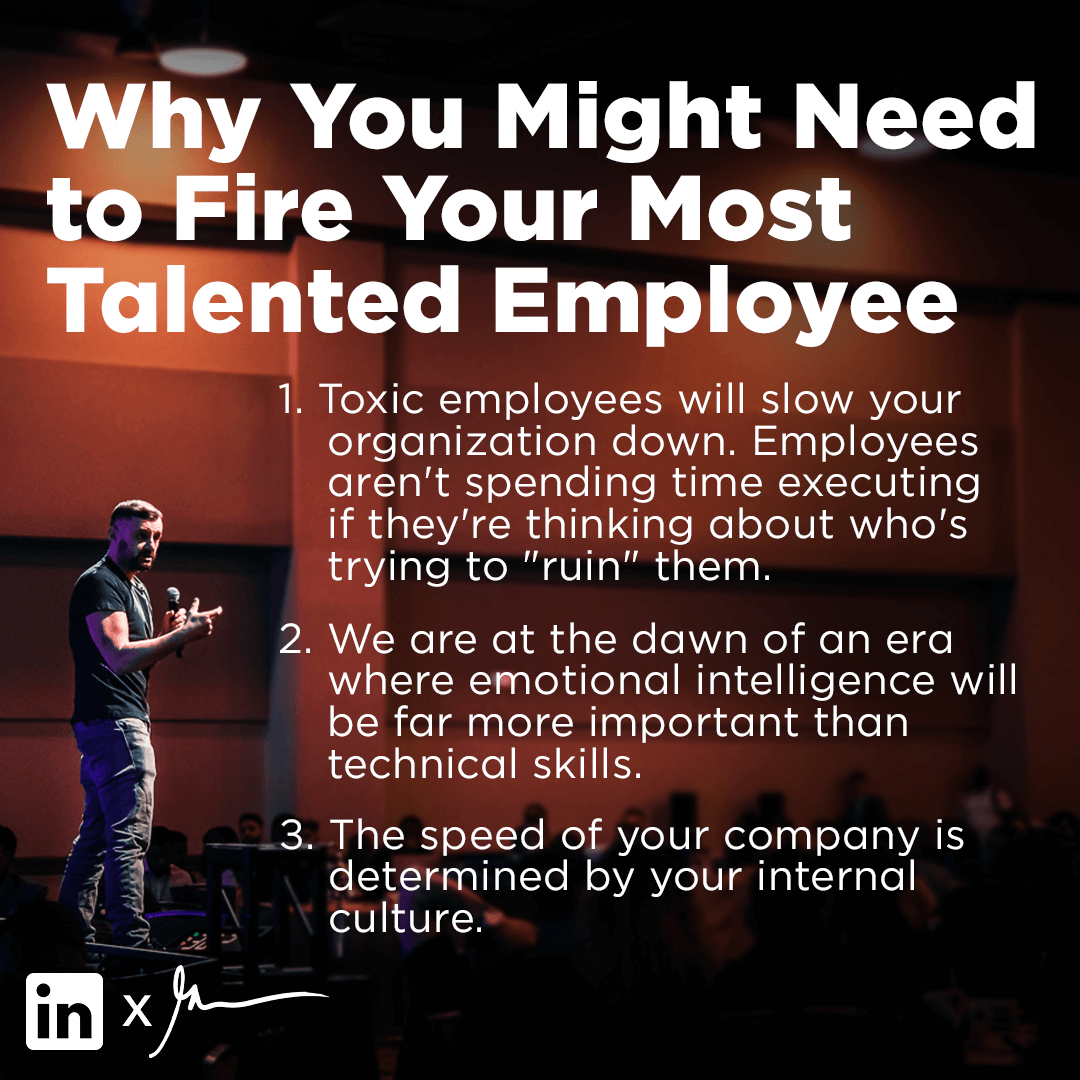Most businesses really need to adjust their mindset when it comes to hiring and firing employees.
So many are obsessed with short-term performance, “numbers” and quarterly targets. But to build a real long-term business, it takes much higher level thinking.
It’s about focusing on overall culture and continuity over short-term financial performance.
Why good performance doesn’t make up for bad behavior
What a lot of people don’t understand is, speed in business comes from great internal culture. The biggest things that will make your company go fast is 1) continuity and 2) lack of politics.
That’s why it doesn’t matter how “great” an employee’s numbers are if he or she makes all the other employees miserable. If they constantly spread negativity or drag other employees down, it doesn’t matter to me how good they are on paper.
If you’re the CEO of a company, it’s imperative that you go audit every single employee in your company, and figure out which ones make the other employees miserable.
It doesn’t matter if it’s your number one salesperson, your best developer, or even your co-founder.
Cancer spreads.
And if you have people in your company that are cancerous, you have to get rid of them no matter how much revenue they bring in.
It comes down to a couple of reasons:
1. If you don’t fire employees who are toxic, they will slow your company down
In a world where competitors are so quick to copy product features, the speed of product output matters over everything else.
And if you have toxic employees within your organization, you’ll have other employees who are scared to have meetings with them. You’ll have people who are spending time navigating discussions with those employees than actually executing.
Your people will be spending time on politics. Not on execution.
When you build a culture where people feel safe and excited to come to work, they won’t worry about dealing with other employees as much.
When they’re not spending any time worrying, they’re spending time executing. If they don’t have to spend 15 minutes a day bickering or figuring out who’s trying to “ruin” them, they’re free to come up with new ideas and actually do the job they were hired to do.
2. Emotional intelligence is way more important than technical skills
We are at the dawn of an era where emotional intelligence will become a very, very important trade.
Technical skills are being commoditized more and more every day. To me, the differentiator between employees in the future will be how they’re able to work with other people, and their level of EQ.
EQ is hard to measure and quantify, but it can be a disproportionate advantage in business. For me, it has helped build leverage with my customers – whether they’re buying a bottle of Wine at Wine Library, or whether they’re clients at VaynerMedia.
EQ can be the differentiator that leads to continuity within an organization. For example, if someone’s performance is constantly bad on paper and they have a high salary, most managers and leaders might think about letting them go.
But what if that person is the emotional support for three other people in the organization who are driving most of the sales? What if that person is someone who other employees can come to when they have personal issues or problems?
These are the types of employees that make the entire engine run, and most business just don’t recognize it.

“But shouldn’t bosses think about WHY toxic employees behave the way they do? What if their personality is just a reaction to the overall company culture, which is also toxic?”
If you’re an employee in a company where the overall culture is toxic, then the best option is to leave.
There’s sadly not much you can do to change the culture of an organization when you’re an employee. Culture is something that’s dictated from the top down.
If the CEO and upper management aren’t building the right culture, there’s unfortunately not much you can change.
“If an employee is toxic, shouldn’t you spend time trying to correct that behavior first? Why would you fire them outright?”
Sure, I’m a huge fan of giving people more than one chance.
We’re not in the one, two, or three strike policy at VaynerMedia. I always try to sit down with people, give feedback on their performance, and break through to them and penetrate any lack of self-esteem or negative upbringing. I try to get them to a place where they can perform well and get along with the other employees they work with.
But my biggest concern is, what happens if the employee fails again? What if they fail a second, third, or fourth time? What if they continue to make the other employees they work with miserable?
Do you “look the other way” because they’re bringing in revenue or because they’re a key part of your organization?
If you’re a CEO who does, then you can’t say that you value good culture.
Because you don’t.
If you liked this article, please please share it on Twitter! Really want more CEOs and leaders to read this.











